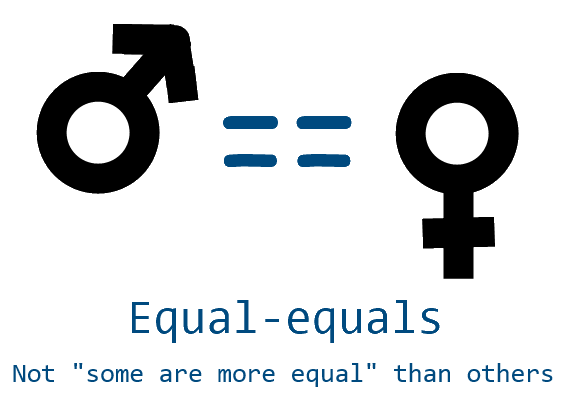
The Merriam Webster online dictionary defines feminism as “the belief that men and women should have equal rights and opportunities.” This isn’t radical, hopefully. The best case scenario is that people do agree with this, because humans are humans regardless of gender. Surely, feminism isn’t bad? Then why isn’t gender equality an actuality?
However, they have also defined it as, “Organized activity in support of women’s rights and interests.” This is the reason people all over the world are not always comfortable with calling themselves feminists. This organized activity brings to mind pictures of fringe extremists violently protesting the existence of a patriarchy which shouldn’t exist. These protesters are loud, demanding, and get in the news a lot. Their end goal might have been gender equality, but all they are doing today is garnering a bad reputation for feminists, and consequently people are nervous about calling themselves feminists.
Feminism places too much weight on women. To begin with, it constantly victimizes women. This is often the case, both developing and developed countries, but it is not empowering to hear that yes, women are the weaker gender; and it is not a good deed to respect a person simply because their gender has been the historic victim. Feminism is the radical belief that both men and women, although biologically different, are human—and thus, equal.
Simply by victimizing women, men are being de-victimized. Just as women are human so are men. It is not gender equality when people say, “Man up.” It is a gender stereotype that men are emotionally and physically stronger. This can be true, but it doesn’t have to be. What is true about statements such as those, is that they create a divide between the genders. Statements such as the one above are being said on a daily basis, and unconsciously reinforce the stereotype that women are the weaker gender. The contrast is in the world constantly reinforcing these stereotypes while wondering why there still isn’t gender equality.
Feminism is organized activity in support of women’s rights and interests. The most vocal activity is, as presented above, those of protesters. While protesting was extremely effective even up to 70 years ago, today it is losing clout because most developed countries already have laws in place protecting and promoting women and their careers. Developing countries are following this lead. This shows that there is organized activity in support of women’s rights, yet there are thousands upon thousands of women’s rights violations on a daily basis.
WE’RE IN IT TOGETHER
This means that the information is present, but it is not being applied properly. This is because feminism puts too much focus on women and ignores men. It is not enough that institutions for women (women in engineering departments in US universities, to take an example) exist. There needs to be active questioning of the existence of such institutions.
These institutions exist because discrimination within the traditional field, and by creating counterparts solely for women we are firstly reinforcing the belief that women need the extra assistance and creating a divide between the genders; and secondly we are not addressing the root cause—the presence of gender discrimination within the field itself.
Therefore, just as organized activity paints the picture of violent feminists, it is taking away focus from the true heroes of feminism. The people who go beyond saying that women are being discriminated against, but go to the perpetrators and explain why that was gender discrimination and why it is not right.
They address the cause by educating why it is wrong, rather than addressing the symptoms by saying that it is wrong.
Addressing the cause is inclusive, and does not put the blame on anyone—because the blame is on everyone. Gender discrimination has not continued existing because of only men beating down on the rights of women, but also because women have rarely risen up to unified collective action. When women belittle other women, is it strange that men do too? The lack of sisterhood is not only a historical fact but a current one.
Feminism is not bad, neither does it advocate radical beliefs; however gender equality does not exist because of very concrete reasons. Feminism places too much focus on women and not enough on men. This is a sustainable practice when women’s rights are not very existent in society but now, a large part of the world does have laws and rules in place which protect women. Now the problem is second generation sexism—it is the subtle kind which is ingrained and can be seen through comments like man up and institutions such as Women in Engineering. To counteract this we need to promote an inclusive culture, one where no fingers are pointed. One where both men and women understand their contribution to sexism. One where feminism isn’t seen as a dirty word, because it isn’t.
Promoting understanding is critical here, because it is only though understanding about why something is wrong or bad that we discourage unconscious and conscious sexism, and instead encourage the existence of a generation where the word feminism is no longer necessary because it is already an actuality.
For this the genders need to work together because it takes two to tango.

